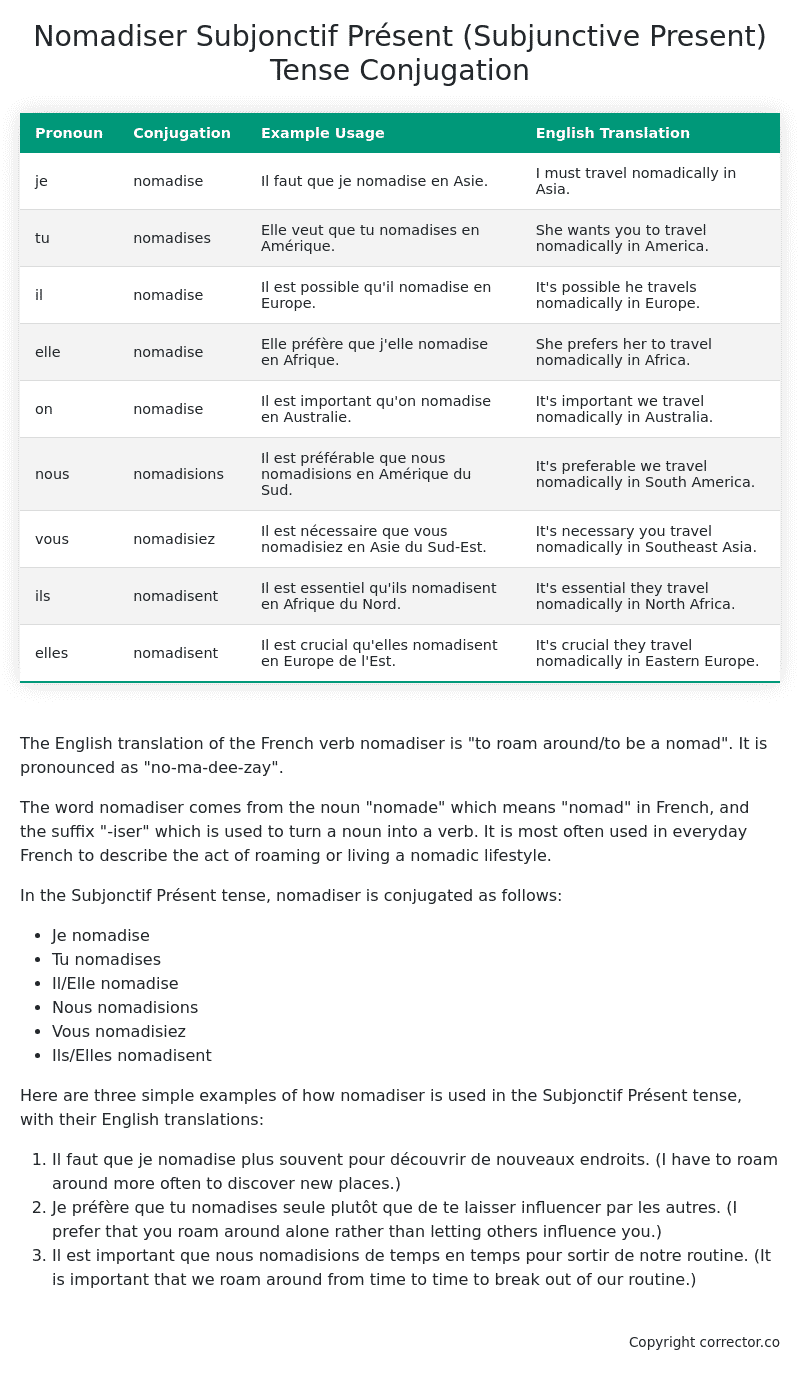Subjonctif Présent (Subjunctive Present) Tense Conjugation of the French Verb nomadiser
Introduction to the verb nomadiser
The English translation of the French verb nomadiser is “to roam around/to be a nomad”.
It is pronounced as “no-ma-dee-zay”.
The word nomadiser comes from the noun “nomade” which means “nomad” in French, and the suffix “-iser” which is used to turn a noun into a verb. It is most often used in everyday French to describe the act of roaming or living a nomadic lifestyle.
In the Subjonctif Présent tense, nomadiser is conjugated as follows:
- Je nomadise
- Tu nomadises
- Il/Elle nomadise
- Nous nomadisions
- Vous nomadisiez
- Ils/Elles nomadisent
Here are three simple examples of how nomadiser is used in the Subjonctif Présent tense, with their English translations:
- Il faut que je nomadise plus souvent pour découvrir de nouveaux endroits. (I have to roam around more often to discover new places.)
- Je préfère que tu nomadises seule plutôt que de te laisser influencer par les autres. (I prefer that you roam around alone rather than letting others influence you.)
- Il est important que nous nomadisions de temps en temps pour sortir de notre routine. (It is important that we roam around from time to time to break out of our routine.)
Table of the Subjonctif Présent (Subjunctive Present) Tense Conjugation of nomadiser
| Pronoun | Conjugation | Example Usage | English Translation |
|---|---|---|---|
| je | nomadise | Il faut que je nomadise en Asie. | I must travel nomadically in Asia. |
| tu | nomadises | Elle veut que tu nomadises en Amérique. | She wants you to travel nomadically in America. |
| il | nomadise | Il est possible qu’il nomadise en Europe. | It’s possible he travels nomadically in Europe. |
| elle | nomadise | Elle préfère que j’elle nomadise en Afrique. | She prefers her to travel nomadically in Africa. |
| on | nomadise | Il est important qu’on nomadise en Australie. | It’s important we travel nomadically in Australia. |
| nous | nomadisions | Il est préférable que nous nomadisions en Amérique du Sud. | It’s preferable we travel nomadically in South America. |
| vous | nomadisiez | Il est nécessaire que vous nomadisiez en Asie du Sud-Est. | It’s necessary you travel nomadically in Southeast Asia. |
| ils | nomadisent | Il est essentiel qu’ils nomadisent en Afrique du Nord. | It’s essential they travel nomadically in North Africa. |
| elles | nomadisent | Il est crucial qu’elles nomadisent en Europe de l’Est. | It’s crucial they travel nomadically in Eastern Europe. |
Other Conjugations for Nomadiser.
Le Present (Present Tense) Conjugation of the French Verb nomadiser
Imparfait (Imperfect) Tense Conjugation of the French Verb nomadiser
Passé Simple (Simple Past) Tense Conjugation of the French Verb nomadiser
Passé Composé (Present Perfect) Tense Conjugation of the French Verb nomadiser
Futur Simple (Simple Future) Tense Conjugation of the French Verb nomadiser
Futur Proche (Near Future) Tense Conjugation of the French Verb nomadiser
Plus-que-parfait (Pluperfect) Tense Conjugation of the French Verb nomadiser
Passé Antérieur (Past Anterior) Tense Conjugation of the French Verb nomadiser
Futur Antérieur (Future Anterior) Tense Conjugation of the French Verb nomadiser
Subjonctif Présent (Subjunctive Present) Tense Conjugation of the French Verb nomadiser (this article)
Subjonctif Passé (Subjunctive Past) Tense Conjugation of the French Verb nomadiser
Subjonctif Imparfait (Subjunctive Imperfect) Tense Conjugation of the French Verb nomadiser
Subjonctif Plus-que-parfait (Subjunctive Pluperfect) Tense Conjugation of the French Verb nomadiser
Conditionnel Présent (Conditional Present) Tense Conjugation of the French Verb nomadiser
Conditionnel Passé (Conditional Past) Tense Conjugation of the French Verb nomadiser
L’impératif Présent (Imperative Present) Tense Conjugation of the French Verb nomadiser
L’infinitif Présent (Infinitive Present) Tense Conjugation of the French Verb nomadiser
Struggling with French verbs or the language in general? Why not use our free French Grammar Checker – no registration required!
Get a FREE Download Study Sheet of this Conjugation 🔥
Simply right click the image below, click “save image” and get your free reference for the nomadiser Subjonctif Présent tense conjugation!

Nomadiser – About the French Subjonctif Présent (Subjunctive Present) Tense
Formation of the Subjonctif Présent
Common Everyday Usage Patterns
Interactions with Other Tenses
Summary
I hope you enjoyed this article on the verb nomadiser. Still in a learning mood? Check out another TOTALLY random French verb conjugation!


